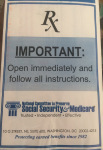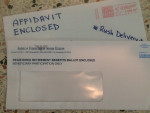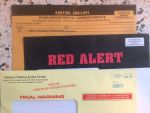Kip Koelsch's Blog, page 5
April 19, 2019
Sinkhole (short fiction): Part Two
Erik looked at Caroline sleeping soundly in their hotel bed and felt the tug of comfort–the warmth of her body and the calm of her gentle breaths. But he couldn’t stay. He. Could. Not. Stay.
The local police had restricted access to their property. The county sheriff had restricted access to his street. The state police were simply bypassed by the FBI–who evacuated a perimeter a mile in diameter.
They had not been allowed to return to the undamaged portion of their home–to pack a bag, retrieve a wallet or grab a phone. Luckily, one of the local sheriff’s deputies allowed him to make a call to his commander at MacDill Air Force Base in Tampa. A courrier (in this case a very junior second lieutenant) from the U.S. Special Operations Command met him at the local Hampton Inn with a new military ID, an encrypted cell phone and a plain envelope. Inside the envelope were $500 in twenty dollar bills, a credit card in his name and printed orders from much further up his chain of command.
[image error]It wasn’t the orders that roused him from his hotel bed–what played repetitively through his mind. It was an image–the gleaming, stainless steel monolith surrounded by skeletons. It was how his eyes were drawn past the bleached bones and into the cube.
Into the cube? He shook his head as he pulled on his grey Navy sweatshirt. Yes–drawn in. The warmth of the sweatshirt wasn’t enough to stop the chill of cold sweat running down his back. His eyes were drawn past the bleached bones and into the stainless steel–but that’s were sense morphed into emotion. Feeling. Was it a feeling?
Quietly, he unlatched the chain on the hotel room door and slipped out without giving his slumbering wife another glance.
A few minutes later Erik stood outside and in front of the Hampton Inn–staring blankly. Focusing on the visual memory, he was again drawn into the cube–into the hazy transition from sight to…It was a feeling. The emotion he found in the silver mist of the cube was indistinct–not dark or light. Powerful, yet undefinable. Unclear, yet strong enough for him to leave his bed and his hotel.
In those intensely introspective moments, Erik hadn’t noticed that his eyes had closed, but he did notice when they opened–and quickly narrowed in the blinding glare of spotlights. Through the raised hand that quickly shielded his eyes, he now found himself not standing in front of the hotel, but at the bottom of a sinkhole standing on top of a large stainless cube surrounded by prostrate skeletons and more than a dozen alarmed FBI agents and analysts.
###
April 9, 2019
Sinkhole (short fiction): Part One
“Wake up!” Caroline shook Erik hard. During two tours in Iraq he had learned to sleep through most anything. Caroline’s prodding and shouting was nothing.
“Erik!” This time her prodding was amplified as the whole house shook and the explosive sound of splitting wood cracked the air.
“What?” He mumbled and rolled upright–eyes widening.
“The house!”
“We need to leave!”
Grabbing the mag light under his nightstand and Caroline’s hand, Erik headed for the bedroom door. The front door.
Outside, lights were on in every neighbor’s house but theirs. People filled the street–staring at their house. Mainly staring at the half that now appeared to be falling into the crumbling earth.
“Sinkhole. We’ve already called 911.” A neighbor shook his head. It was an all too common occurrence in modern Florida. Karst topography close to the surface, water drained from the underlying rock for a growing, thirsty populace (and their lawns).
Erik looked at Caroline. “Stay here.” He trotted off towards the hole. a few neighbors joined him with their big flashlights.
At the edge he looked at the two rooms of his house now dangling off the edge of what looked like a 90-foot wide collapsed cavern. The flashing beams of multiple flashlights played across the hole like a Hollywood premier–until more than one stopped on a single spot under the far edge.
“A stainless steel refrigerator?” shouted one of the neighbors.
Erik shook his head. “No”
[image error]Deliberately placing his feet as he skirted the hole for a better look, Erik jerked to a stop when he could make out the brightly lit object. It was a stainless steel cube–approximately ten feet by ten feet by ten feet. Surrounding it were at least a dozen bleached, human skeletons laying prostrate before the monolith.
###
Sinkhole
“Wake up!” Caroline shook Erik hard. During two tours in Iraq he had learned to sleep through most anything. Caroline’s prodding and shouting was nothing.
“Erik!” This time her prodding was amplified as the whole house shook and the explosive sound of splitting wood cracked the air.
“What?” He mumbled and rolled upright–eyes widening.
“The house!”
“We need to leave!”
Grabbing the mag light under his nightstand and Caroline’s hand, Erik headed for the bedroom door. The front door.
Outside, lights were on in every neighbor’s house but theirs. People filled the street–staring at their house. Mainly staring at the half that now appeared to be falling into the crumbling earth.
“Sinkhole. We’ve already called 911.” A neighbor shook his head. It was an all too common occurrence in modern Florida. Karst topography close to the surface, water drained from the underlying rock for a growing, thirsty populace (and their lawns).
Erik looked at Caroline. “Stay here.” He trotted off towards the hole. a few neighbors joined him with their big flashlights.
At the edge he looked at the two rooms of his house now dangling off the edge of what looked like a 90-foot wide collapsed cavern. The flashing beams of multiple flashlights played across the hole like a Hollywood premier–until more than one stopped on a single spot under the far edge.
“A stainless steel refrigerator?” shouted one of the neighbors.
Erik shook his head. “No”
Deliberately placing his feet as he skirted the hole for a better look, Erik jerked to a stop when he could make out the brightly lit object. It was a stainless steel cube–approximately ten feet by ten feet by ten feet. Surrounding it were at least a dozen bleached, human skeletons laying prostrate before the monolith.
###
March 18, 2019
5-STAR REVIEW: DELPHYS RISING
[image error]
Delphys Rising by Kip Koelsch follows on from the author’s first book, Wendall’s Lullaby, and tells the story of one man’s determination and obsession to communicate with dolphins. It has always been known that dolphins are highly intelligent and that they communicate with one another via clicks and high-pitched noises, but can humans decipher these sounds, and can they respond so that the dolphins understand? Bee is a dolphin who may just be able to do that. Hans is a nine-year-old who can identify the dolphins through their sound and Dr. Evan McMillon might just have invented a means to perfect the communication with Delphys. But other forces are at work, and ghosts from his past seem determined to destroy his life’s work.
[image error]The author has crafted an amazing scenario that seems all the more plausible because of his skillful and knowledgeable writing. The characters all come across as authentic and credible, and the whole scenario leads the reader to believe that such a center exists. The setting is in Tortola, and the writer describes the scene perfectly which transports the reader to the dolphin world. I have not read the first book by Kip Koelsch, but Delphys Rising is a stand-alone book and it did not deter me from enjoying and relating to the story. It certainly encourages the reader to pick up the first book to relate to the origin of the story and to the transition of Dr. Evan McMillon. The writing and the dialogue flow well, making this an enjoyable read from the start. An author to watch.
–Reader’s Favorite, 2019
March 13, 2019
DELPHYS RISING: NOW AVAILABLE
[image error]FOR MILLENNIA HUMANS HAVE DREAMED OF SPEAKING WITH DOLPHINS AND FAILED.
UNTIL NOW. UNTIL DELPHYS.
In 2008 a young genius conceived Delphys—an innovative dolphin communication project—while submerged in the warm, salt water of a sensory deprivation tank and dark introversion of a forced separation from the woman he loved.
Nearly ten years after that epiphany—and after years of focused research, design and construction on an isolated Pacific atoll—that genius has embraced his new identity and become Dr. Evan McMillon–finally leaving the past behind. He has even found love again.
Now his Delphys team is poised to boot up their powerful artificial intelligence, initiate the world’s first contact with dolphins and ultimately transform that conversation into something much more ambitious—a covert operation that will surprise the project’s military backers and the world.
But when Dr. McMillon loses control of that ground-breaking conversation, he discovers toxic tendrils from his past infiltrating the very core of Delphys and wrapped around his heart. He also learns of the product of one passionate memory that may be the key to regaining control and completing his ambitious plan to change the world.
My second novel DELPHYS RISING (the follow-up to Wendall’s Lullaby) is now available for sale as a paperback or an ebook on Amazon.com.
March 12, 2019
Running from The Apocalypse
This morning I’m running from The Apocalypse.
Now, on my best day (that’s with six months of consistent training and ten pounds off my body) I’m usually a middling to average age grouper. I may be able to pull off sub-nine miles in ideal (cool, low humidity) conditions. But The Apocalypse rarely comes for you in ideal conditions. This particular morning was no different. An unexceptional fog thickened the air just enough to obscure the streetlights–blurring the shadows–and keep the exhaust fumes and fireplace smoke hanging low–a pungent irritant. Morning sounds took on that peculiar fog-enhanced quality–muffled, yet at the same time enhanced.
All these characteristics coalesced in a keen way–letting my senses get a whiff of just how close The Apocalypse was getting and how fast it was gaining on me. Because The Apocalypse was never quiet and it stank.
That was to be expected of course. The Apocalypse was a big deal. And though it could swiftly sweep across towering mountain ranges, vast oceans and even Michigan Avenue in Dunedin, FL, it was anything but subtle.
That made getting caught by The Apocalypse even more demeaning–more destructive. I could hear it coming and I could not accelerate. I could hear the stab of one foot and the drag of the other–not an efficient stride in the least. But the power and endurance of The Apocalypse made up for that. It simply kept coming–relentless. It didn’t stop for water or Gatorade or a gel–it plowed ahead. It endured. It persevered. It never stopped.
As I passed the fire station the drag of The Apocalypse’s one foot echoed like thunder off the huge garage doors. It was closing in.
I tried to run faster–to make my feet lighter. I sucked in more air–through my mouth. Through my nose. It was thicker now–like a fresh frozen milkshake laboriously drawn through a straw of inadequate diameter. It lingered in my nose hairs–my nasal passages–and saturated my olfactory receptors with the burned diesel fuel stink of The Apocalypse.
[image error]My shirt was saturated–dampness from the fog mixed with the moist, foul breath of The Apocalypse closing in. I was almost to the stoplight at Pinehurst Road–my turnaround point–and contrary to a typical morning the sky became claustrophobically darker.
I ran hard to the intersection and abruptly pivoted 180 degrees to face The Apocalypse–better to be annihilated facing the darkness. Right? Right. Yet as I completed my pivot and fell back into my normal stride I wasn’t stopped by a wall of chaos, the screeching of evil or the stink of rot–I ran unimpeded. I ran all the way home. I didn’t run any quicker. But I did run with something in my head–the idea for this little story.
February 4, 2019
JUNK MAIL REDUX: Feel the Rage
[image error]Many of you know the adventure we’ve been through over the last three years to reduce/stop the junk mail that had been inundating my 86-year old father. At one point he was receiving up to 100 pieces of mail a day and often was duped into making donations to some very questionable “charities” and other organizations. In addition to having all his mail directed to our home, we made calls, sent emails, mailed letters and sent messages on Facebook to over 800 of these groups to remove him from their mailing lists. While the mail has not completely stopped, we now only receive 1-6 pieces of junk mail for him a day at our home.
The other thing we did (not entirely because of the mail situation, but I won’t lie and say it wasn’t part of the reason) was we moved him to a new home–AND we did not give anyone (including the U.S. Postal Service) a forwarding address.
He has lived there over a year and a half and I’ve not seen but a very occasional piece of junk mail that I’ve had to “intercept” from his pile. Well, yesterday that changed. There were three pieces of mail from some of the most nefarious of junk mail scammers that prey on the elderly and anyone with slight cognitive impairment. I was livid–and I managed to slip them into a bag and remove them from my father’s apartment.



I didn’t mention it to my father. His short-term memory isn’t really good enough anymore for me to have an impact–with either this new mail or to remind him of what we went through to stop what he was being buried under in the not-too-distant past. I just had to RAGE in my own mind at the people who use this type of “marketing” and then share that with my wife (who made the majority of the aforementioned phone calls).
Today I called two of those organizations to have his new address removed from their databases. I was lucky in that these were two that actually had phone numbers that were available with a quick internet search. Of course, I got a recording and had to leave a message, but at least there was a number to call. I can only hope they honor my request and stop pestering my father.



Again, if you have elderly parents or grandparents–even if they don’t have the slightest of cognitive impairments–get a good look at their mail whenever you can. Monitor it regularly and look for the junk that looks inflammatory, persuasive, preys on their fears (especially about Social Security and Medicare) or has an “official look” (made to look like an invoice or an official government document).
I cannot express how angry these people make me. I cannot express how exasperated I am with the Direct Mail Industry. They need to do a much better job policing their own. If not, the U.S. Postal Service or state’s attorney generals or the attorney general of the United States need to do more to protect it’s elderly citizens. I wish there was a way to fund and build a wall that would stop this crap from getting to our seniors–because right now I feel like I’m trying to hold off the invasion of Normandy with a slingshot.
January 25, 2019
Review: BookLife/Publishers Weekly
[image error]“In Koelsch’s imaginative, plausible suspense novel, scientists around the world are baffled when hundreds of dolphins beach themselves in Texas, Virginia, and Mozambique, numbers far greater than ever previously observed.”
“Fans of the film The Day of the Dolphin will enjoy this unusual and intelligent thriller.”
January 9, 2019
PUBLISHER'S WEEKLY REVIEW OF WENDALL'S LULLABY

https://booklife.com/pwreview/231329
December 17, 2018
THE PERFECT GIFTS FOR AUTHORS?
[image error]I can’t speak for every author, but as a relatively new fiction author there are only a few things that I’d really love to receive as gifts this holiday season.
Book Reviews: if you have read and enjoyed my first novel Wendall’s Lullaby, please take a moment to go to Amazon or Goodreads and leave even a brief review.
Book Sales: buy a paperback or an ebook for yourself or as a gift for someone who likes to read.
Social Media Shares/Likes: if you see a post for my book on Facebook or Twitter, please share it if you can. If don’t want to share the post, please “like’ it. This is a huge help in reaching new potential audiences.
Library Donations: make a donation to your local library or take a moment to donate old books to your local library or Little Free Library. Check out that Little Free Library concept too. If you really like it, think about “gifting” a Little Free Library to your neighborhood or local park.
Beer.
A Part-time job that allows me time to write, attend book events and produce my trail running and fun triathlon events.
Book Reviews: oops, I mentioned these already.
Books: I love to read fiction and non-fiction and books always make great gifts!
Of course, the greatest gift anyone can have is family and friends and I’m grateful for everyone in my life–especially my wonderful wife (and editor), Jules.
Now, Happy Reading! And Happy Holidays!



